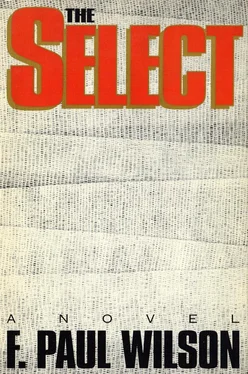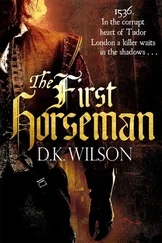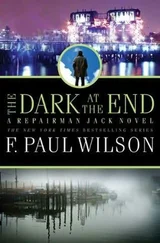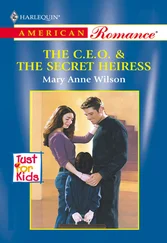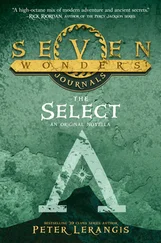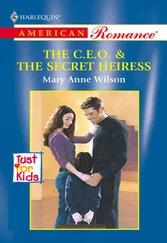F. Wilson - The Select
Здесь есть возможность читать онлайн «F. Wilson - The Select» весь текст электронной книги совершенно бесплатно (целиком полную версию без сокращений). В некоторых случаях можно слушать аудио, скачать через торрент в формате fb2 и присутствует краткое содержание. Жанр: Старинная литература, на английском языке. Описание произведения, (предисловие) а так же отзывы посетителей доступны на портале библиотеки ЛибКат.
- Название:The Select
- Автор:
- Жанр:
- Год:неизвестен
- ISBN:нет данных
- Рейтинг книги:4 / 5. Голосов: 1
-
Избранное:Добавить в избранное
- Отзывы:
-
Ваша оценка:
- 80
- 1
- 2
- 3
- 4
- 5
The Select: краткое содержание, описание и аннотация
Предлагаем к чтению аннотацию, описание, краткое содержание или предисловие (зависит от того, что написал сам автор книги «The Select»). Если вы не нашли необходимую информацию о книге — напишите в комментариях, мы постараемся отыскать её.
_________________
The Select — читать онлайн бесплатно полную книгу (весь текст) целиком
Ниже представлен текст книги, разбитый по страницам. Система сохранения места последней прочитанной страницы, позволяет с удобством читать онлайн бесплатно книгу «The Select», без необходимости каждый раз заново искать на чём Вы остановились. Поставьте закладку, и сможете в любой момент перейти на страницу, на которой закончили чтение.
Интервал:
Закладка:
"What do you think?" Harrison said. Quinn wondered if anybody knew his first name. "Yes or no on the back crackers?"
"Definitely yes," Tim said. "Acupuncturists too. We've got to find a tier for every therapy if this is going to work."
Quinn waited for the zinger, the gag line that would turn around what he'd just said. But it never came.
"All right," Judy said. "Where to we lump them?"
"With the physical therapists," Tim said. "Take away all their mumbo-jumbo and look at what they do: physical therapy."
Quinn watched and listened in shock. "I thought you were against any kind of rationing," she said.
"I was," Tim said.
"Well, what happened?" Quinn realized that although she and Tim did a lot of talking, the future structure of healthcare delivery was not a topic of conversation. She had no idea he'd come around 180 degrees.
"That was before I realized the full scope of the problem. The day is coming when there won't be enough care to go around. And that means some people are going to have to make do with lower levels of care. Tiering is the only way to decide who gets what, Quinn. The only way."
She heard murmurs of agreement and saw heads nodding in agreement all around the room.
"What are you saying? Someone gets past a certain age and we throw them to the wolves?"
"Nothing so blunt as that," Harrison said. "Age should not be the sole criterion. Overall value to society should be considered. Of course, the older you are, the fewer years you have left— ipso facto , your chances of contributing much are reduced. Plenty of people of all ages contribute nothing. The homeless, the drunks, the addicts are the most obvious, but there are others, less obvious. People we never see, shut-ins who sit at home and do nothing. Should some couch potato on welfare get a coronary bypass while a hard-working mechanic who's the father of three has to go on working with chest pain? I don't think so."
"I don't think so either. But who's going to decide who gets stuck in which tier? Who's going to arbitrate human value?"
"You can bet we'll have something to say in it," Tim said. "Especially those of us who go into primary care. We'll be deciding who gets referred and who doesn't."
"But this tiering idea, this dividing people up and stacking them in order of how useful they are is so...cold." She turned to Tim. "What about compassion? Remember how we talked about finding a CPT code number for compassion?"
"Yeah," Tim said softly, his eyes suddenly distraught. "I remember. Trouble is, I don't know how I forgot."
Quinn didn't know what it was, but something in Tim's eyes unsettled her.
THIRTEEN
Quinn had a few moments so she wandered across the lab to where Dr. Emerson was reading a journal article. He looked up at her approach and smiled.
"Taking a break?" he said.
Quinn nodded. "My computer's tied up with some number crunching on that reuptake program. It'll be another ten minutes or so till it's done."
"Very good." He nodded and returned to his article.
"Uh, Dr. Emerson," Quinn said, not sure of how to broach this. She'd rehearsed her opening all last night and most of today, but still she felt awkward. "Can I ask you a strange question?"
"Sure," he said, still reading. "Go ahead. I've always liked strange questions."
"What's going on here?"
He looked up at her over the tops of his reading glasses.
"I'd think you'd know the answer to that by now. We're putting 9574 through—"
"No. Not here in your lab. I mean in the school. In The Ingraham. What's going on here?"
Dr. Emerson put the journal down and removed his reading glasses. He stared at her.
"I'm not quite sure I'm following you, Quinn."
She dropped into the seat opposite him. "I'm not sure I'm following me either. It's all so vague." She groped for the right words, the appropriate analogy, but came up empty. "It's just that everybody here at The Ingraham seems to think alike, seems to have the same point of view."
"That's not so unusual, really," Dr. Emerson said. "It happens at many academic institutions. Certain points of view gain favor with an influential segment of a department, take root, bloom, and draw other like-minded individuals. As this group gains influence and tenure, those who strongly disagree with its positions tend to drift away, while those who agree or are indifferent stay on. Look how the deconstructionists came to rule the English department at Yale. Or—"
"But I'm not talking about a department. I'm talking about a whole institution—students and faculty alike."
"The Ingraham? Maybe you'd better explain."
Quinn took a deep breath. How was she going to explain this in a sane and coherent manner when it all sounded pretty crazy to her?
"Everyone's starting to sound like Dr. Alston."
Dr. Emerson burst out laughing. "Oh, I hope not! I truly hope not!"
"It's true. They're all starting to sound like his lectures. Why just last night—"
Dr. Emerson put one hand and her arm and raised the other to wave someone in from the hall.
"Arthur! Come in, Arthur. I want you to hear this."
Quinn turned and started at the sight of Dr. Alston strolling through the door and approaching them. What was Dr. Emerson doing? Was he trying to get her in more trouble with Dr. Alston?
"You remember Miss Cleary, don't you?"
"Ah, yes," Dr. Alston said, nodding to her. "The object of my wrath a few weeks ago. I do believe I overreacted. My apologies, Miss Cleary."
"I'm glad you apologized, Arthur," Dr. Emerson said. "Because Quinn here just paid you a compliment."
Dr. Alston smiled thinly as he looked down at her. "Did she now? And what did she say?"
Quinn fought the urge to tell him not to refer to her in the third person. She was here in the same room and quite able to answer for herself.
"She thinks you're a very persuasive lecturer."
The thin smile broadened. "Is that so?"
"Yes. She says the whole student body is beginning to sound like you."
Dr. Alston's gaze became penetrating. "May I infer from your perspective that you have somehow managed to remain immune to the sway of my rhetoric?"
Quinn swallowed. This wasn't going well at all.
"I think you argue your points very well, but I find it difficult to accept the concept of rationing medical care on the basis of social and economic worth."
"Given the inevitability of such rationing," he said, his manner cooling quickly, "what criteria do you propose?"
"I don't think I'm qualified to make decisions of that magnitude," Quinn said. "I don't know if anybody is. But I've read where it used to be widely held that global communism was inevitable, how it was only a matter of time before Marxism took over the world. And now the USSR is gone. I'm sure there are plenty of other 'inevitabilities' that have never become reality."
"I'm sure there are too, Miss Quinn," Dr. Alston said, nodding slowly as he stared at her. His gaze made her uncomfortable. "I'm glad we had this little talk. You've given me something to ponder."
He nodded goodbye to her and Dr. Emerson, then left.
Quinn shook off a chill and turned back to Dr. Emerson.
"Am I such a Pollyanna?" she said. "I mean, why do I seem to be the only one in The Ingraham who isn't falling into line behind Dr. Alston's bleak outlook?"
"Knowing Arthur," Dr. Emerson said, "I'm sure he's wondering the very same thing."
*
As Louis Verran approached Alston's office in the faculty building, he wondered what Dr. Tightass wanted. Whatever it was, he knew it couldn't be good. Not from the tone of voice he'd heard on the phone a few minutes ago.
Please come to my office immediately, Louis. I have made a fascinating discovery that I wish to share with you.
Читать дальшеИнтервал:
Закладка:
Похожие книги на «The Select»
Представляем Вашему вниманию похожие книги на «The Select» списком для выбора. Мы отобрали схожую по названию и смыслу литературу в надежде предоставить читателям больше вариантов отыскать новые, интересные, ещё непрочитанные произведения.
Обсуждение, отзывы о книге «The Select» и просто собственные мнения читателей. Оставьте ваши комментарии, напишите, что Вы думаете о произведении, его смысле или главных героях. Укажите что конкретно понравилось, а что нет, и почему Вы так считаете.
